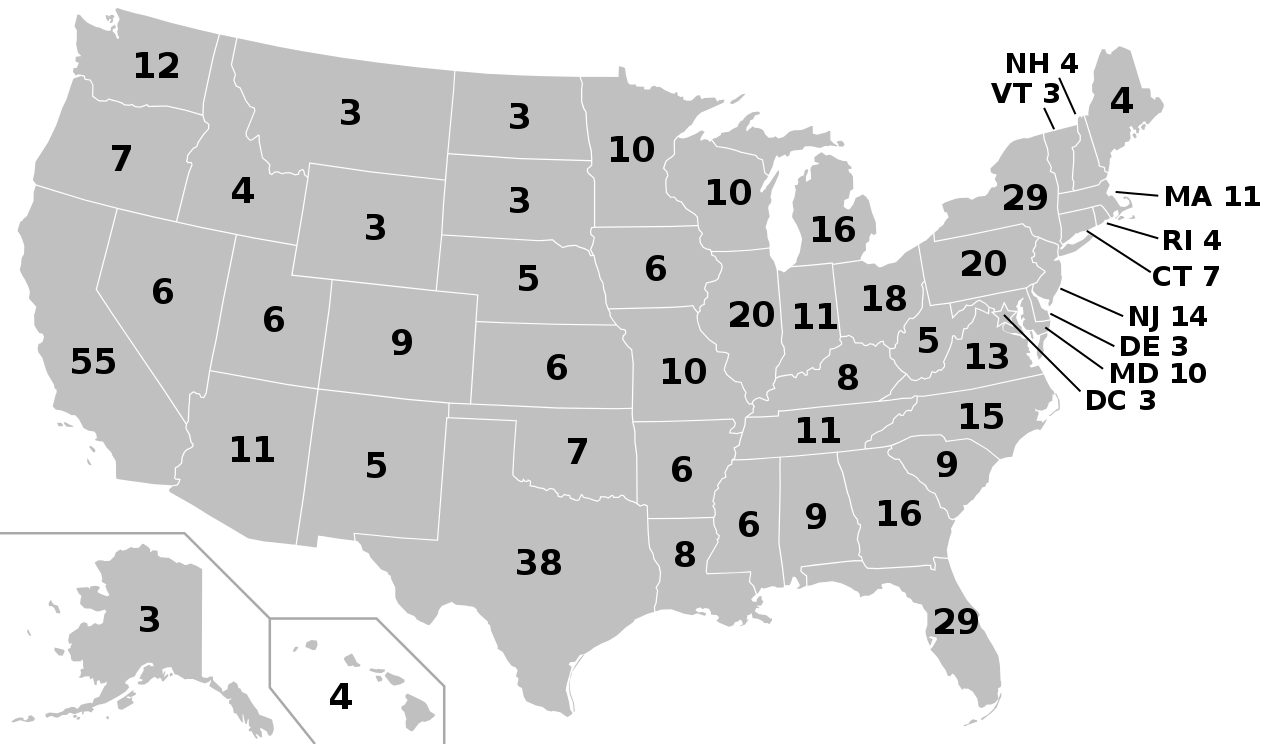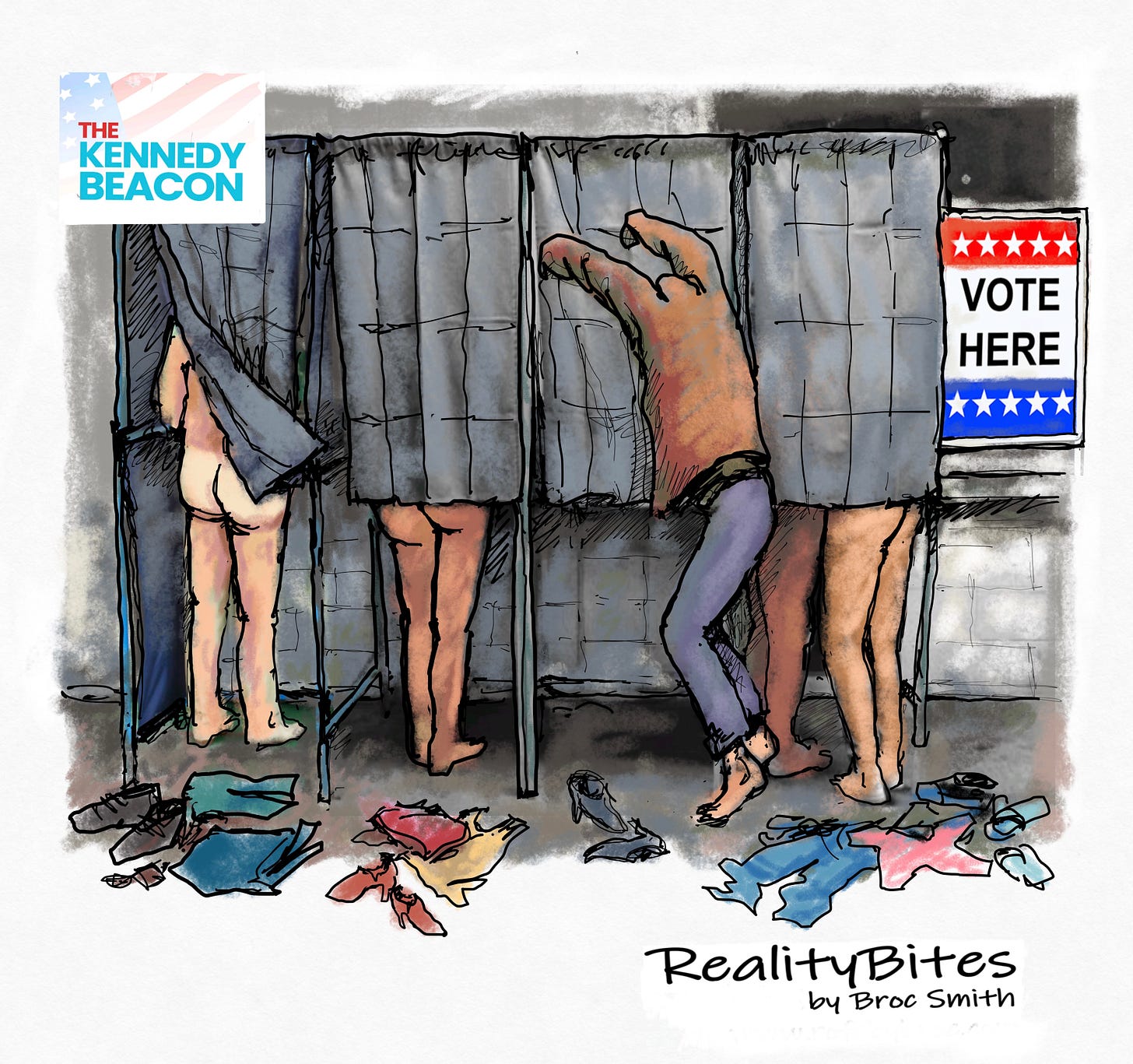Vote Shaming: ‘Tis the Election Season
By Anne Keala Kelly, columnist, The Kennedy Beacon
By Anne Keala Kelly, columnist, The Kennedy Beacon
Shame. It isn’t one of the seven deadly sins, but it’s deadly-sin adjacent. It’s pretty certain the founding premise of the entire New Age movement was to heal the shame that people have internalized since Adam and Eve decided that knowing is more interesting than an unformed mind, and a person can get used to wearing a fig leaf.
There are many scientific studies on the subject of shame. But to understand it in the context of how to get a person to vote a certain way, it might be helpful to note that shame tends to light up the limbic “fight or flight” system, which is more likely to induce a fearful response than logical problem solving. Noted professor, author and TEDTalk speaker, Brené Brown, says, “Shame is the most powerful, master emotion.”
Even though humans have billions of complex processes going on inside our bodies every second, most of our thoughts and reactions are patterns that were set in our brains like grooves on a screw. As Sandy Loder reports in Peak Dynamics, the average person has 60,000 thoughts a day and 45,000 of those land, habitually, in the negative category, which may explain the success of negative campaign ads, as Katelyn Howard reports for NPR.
Shaming succeeds by preying on people’s anxieties, often about rejection. Most people want to belong or, at a minimum, they don’t want to be seen as outliers. Insecurity is a key element in a society that puts a lot of value on how things appear. How many of us have bought something we didn’t need, couldn’t afford, and later regretted?
What does this have to do with the 2024 presidential election?
As the new year looms, or dawns, depending on your level of optimism, Robert F. Kennedy Jr. is up against more obstacles than any other candidate in modern times. Having left the Democratic Party to run as an independent, he is the DNC’s public enemy #1. And despite the fact that his own father’s assassination is what led to the use of Secret Service protection for presidential candidates, President Biden’s administration persistently refuses Kennedy’s requests for protection — even though there have been two credible threats that led to arrests, and one of the men arrested was armed and posing as a member of Kennedy’s security team. There’s a punishing, “you deserve whatever happens to you” tone in how Biden has intentionally left this man vulnerable. Forcing Kennedy to spend millions on his own security is a deliberate tactic designed to bleed his campaign finances dry, as will the legal challenges the DNC will deploy, courtesy of pit bulls like Marc Elias, to stop him from getting onto the ballot, especially in swing states.
Back to Shaming: On the surface, vote shaming is fairly straightforward. Embarrass a person to capture or guide their vote by appealing to their sense of uncertainty or embarrassment over an issue. A good example happened in 2020, when Joe Rogan told his 7 million YouTube followers that he would probably vote for Bernie Sanders. As reported by Zack Beauchamp in Vox, Democrats accused Sanders of not reining in the Bernie Bros, or “dirtbag left,” while transgender activists tied Sanders’ supporters to some of Rogan’s anti-trans commentary. From the moment the Sanders campaign retweeted what Rogan said, according to Greg Krieg reporting in CNN, he was besieged by criticism from colleagues in Congress and pundits in the mainstream media, all of whom know that no candidate can control every opinion of potential voters. Just the mention of Rogan and Sanders in the same sentence became the dog whistle for anyone looking for a reason to doubt Sanders.
People want to be on the so-called right side of history, and nobody wants to become a target, especially on social media where rumors and accusations easily go viral and take on the monstrous (ether) air of a mob. In politics, a lie doesn’t need to have a long shelf life. Once a negative impression is made, it’s like a bite from a venomous snake; good luck getting the poison out fast enough for the truth to matter.
Media has the power to persuade people to believe something even years after it’s been proven to be factually untrue. As reported by the Los Angeles Daily News, on the sixth anniversary of the September 11 attacks, one-third of Americans still believed Saddam Hussein was somehow involved and 40% believed Iraq supported Al-Qaeda.
Whether or not one has an opinion that might breach the walls of the blue or red camp, the tone of political discourse in the US is vitriolic, stifling, and excruciatingly narrow. “Our democracy is under attack,” and “Trump… Trump, anything Trump,” and “Identity politics bad, virtue signaling A-OK.” And then there’s the biggie: Woke… to be it, or not to be it, that is the question.
There is so much ‘othering’ happening in every direction it’s hard to keep up with who or what idea is being demonized or weaponized week after week.
But vote shaming goes beyond online bullying and gifs with vomit or vulgar hand gestures, and should be seen as part of the structural apparatus of electoral politics, like one of its limbs. North Carolina, a swing state, is a prime example of how these things work in tandem.
In 2014, Colin Campbell reported in The News & Observer that the North Carolina Democratic Party and the Sierra Club used a mailer to vote shame as many as 650,000 registered voters. How? By threatening to reveal the public records that track who votes and who doesn’t. In 2018, the GOP also sent targeted mailers to North Carolinians, and informed their neighbors, too, about their voting habits. While that may be offensive and intrusive to some, both parties insist that engaging in such activities gets people out to vote.
Now, six years later, the practice of tracking who votes, combined with the enhanced digital technologies and an unlimited amount of money in politics, will focus heavily on securing electoral votes rather than the popular vote. It’s estimated that only 2% of North Carolina’s voters need to be persuaded to vote a certain way. As Michael Scherer et al. reported in The Washington Post, according to North Carolina’s Republican Party Chair, when it comes to whether or not a Republican wins there, “It’ll be down to 100,000 voters who are undecided going into the election….We can target them.”

As Sara Fisher reports in Axios, according to the advertising agency, GroupM, political advertising in 2024 is projected to be as high as $15.9 billion. Another firm, AdImpact, puts that number at only $10.2 billion. But either way, we should expect between a four and sixfold increase in election spending above the $2.5 billion spent in 2016. With the endless real estate available for digital ads, and speculation about the role of AI, who and what is - or is not - promulgated by the algorithms will depend on who controls that technology and where the money is placed.
How does this expanded digital capacity and vote shaming impact Robert F. Kennedy Jr.’s third-party bid for the presidency? In a sense, vote shaming is not that different from vaccine shaming, which makes Kennedy uniquely positioned to become the most controversial candidate of 2024. He’s labeled as “anti-vax” and he is identified as a threat to the Democratic Party’s ticket. In Democratic Party-think, that makes him a threat to democracy itself.
In a September 1, 2022 speech, President Biden railed about the endless danger of Trump, saying, “Donald Trump and the MAGA Republicans represent an extremism that threatens the very foundations of our republic.” With that as the guiding logic, anyone who doesn’t support Biden is allegedly setting the stage for the re-election of Trump, and nobody is accused of doing that more than Kennedy.
When actor/comedian Michael Rapaport interviewed actor/producer Rob Reiner last month on his podcast, I Am Rapaport, Reiner swiftly presented the Democratic Party’s line. He said, “I even called Bobby Kennedy up, and I said ‘Bobby, you’re gonna put Trump back in the White House’ and he said, ‘No, no. I’m gonna draw more votes from Trump than I will from Biden.’ That’s not true. We don’t know. There are polls that say the exact opposite.” And Rapaport replied, “He thinks he can win? Win what? What the [expletive] is he talking about?”
A few moments later, after Rapaport dumped a truckload of expletive-laden criticism on Kennedy, Reiner said, “The point is, those third-party candidates swing elections [referring to Perot and Nader] one way or the other. And that’s fine when you have a choice between Clinton, or it’s gonna be George HW. Or, you know, I’d rather have Clinton. But this is not that kind of choice. This is, do you want democracy or autocracy? That’s what we’re dealing with here.”
Jon Favreau, a former Obama aide and co-host of Pod Save America, said this of third-party votes: “All people need to know is that, if the people who voted for Jill Stein in Michigan, Wisconsin and Pennsylvania had voted for Hillary instead, Donald Trump would have never become president. That’s it, right? And so, you know, I’m sure there’s a lot of Cornel West fans out there… living in a swing state… you vote for Cornel West, and you are helping Trump become president. That’s it. And you can say ‘Oh well, that’s Joe Biden’s fault...’ No, no, it’s your decision. You get to decide whether you want to help Donald Trump become president or you don’t.”
When it comes to shaming anyone who supports Kennedy, so far, the Democrats are far more ruthless than the Republicans. They seem to think the answer to the alleged “threat to democracy” that his candidacy represents is less democracy, not more. That’s like saying the truth is in danger, so, maybe a little less truth is the way to go.
Perhaps vote shaming isn’t that different from Adam and Eve’s dilemma. For better or worse, they bit into that apple. They chose knowledge and the discomfort of accountability over naked innocence and a perfectly contained life without imagination.
There are generations of people who will reap or mourn the outcome of the decisions we make now about who we choose to lead us. We can let ourselves be shamed into or out of voting this way or that, but maybe what is called for in these times is a remembrance of, or a desire to feel, the opposite of shame. Honor. We have that right. We have that power.





Sigh. As long as the votes continue to be "counted" (ROFL!) in secret, none of the above matters. "Counting" in secret is what the computers are for. Those who get to write the software that runs the computers choose the "winner", regardless of who anyone votes for. The voters are only needed for lending legitimacy to the farce. http://www.thepolemicist.net/2016/09/strike-vote.html
It's going to be a crazy year!